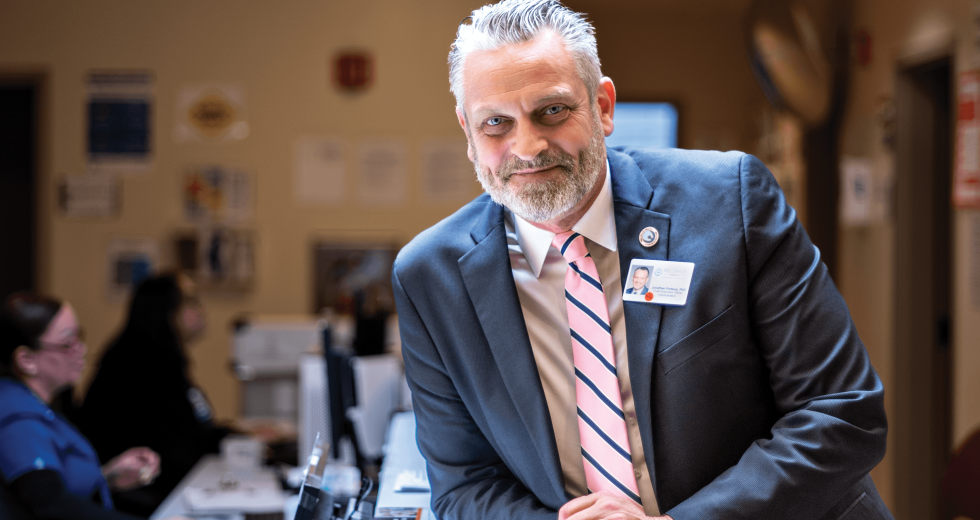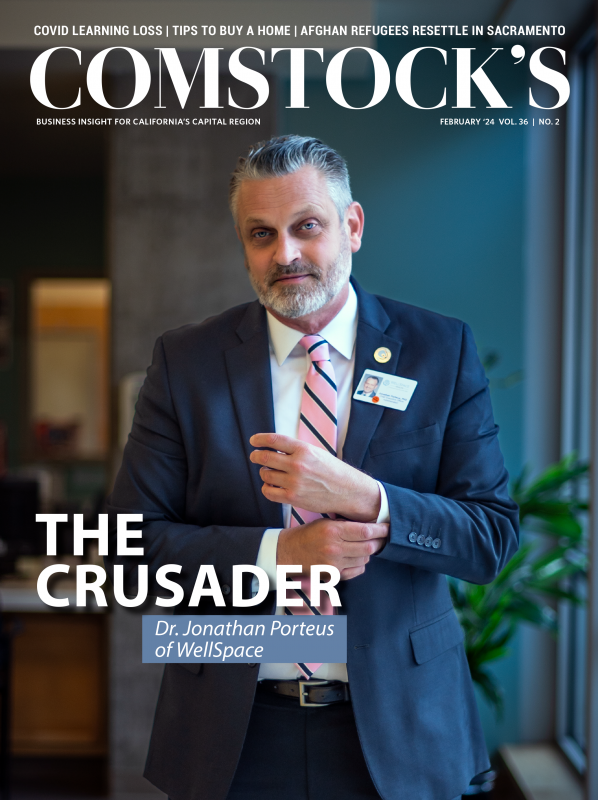Gray curls spilled out of a San Francisco 49ers hat, down the temples of a middle-aged man who didn’t know that just one day before, the team had rolled to another easy victory.
It was a bleary Monday morning in December at WellSpace Health’s Crisis Receiving for Behavioral Health, or “Crib” program. There, people like this man, who we’ll call Charles, can go when they’re in crisis for 24 hours at a time. There are small rooms like the one Charles was sitting in where people can rest. There are also trained staff nearby, as well as free clothing, food and other services.
The Crib is not a catch-all for every person who comes through the doors near 7th and H streets in downtown Sacramento. But it can provide a safe and comforting environment for people like Charles, who started coming in April after suffering a series of woes that he says included losing his wife, experiencing homelessness and being hospitalized.
“I came here and started getting my life back together,” Charles says. “So that’s been a very big help for me.”
Sacramento’s unsheltered homeless population grew from 5,570 in 2019 to 9,278 in 2022 — a 67 percent increase — according to the Point in Time nightly survey done by Sacramento County and volunteers. In 2022, 250 homeless people died. In a state that has roughly one-third of people experiencing homelessness, the Sacramento region has some of the highest numbers of unhoused people in the country. The crisis in recent years of people experiencing homelessness has seemingly coincided with a lack of sufficient behavioral health resources. That said, organizations like WellSpace could be well-positioned and speak eagerly of taking on a growing share of this vital work.
What is WellSpace Health?
By training, Dr. Jonathan Porteus is a licensed clinical psychologist with a deep personal and professional background in working with poor or downtrodden people. For practical reasons, though, he’s been chief executive officer since 2011 of one of the largest companies, health care or otherwise, based in the Sacramento region.
“I may be their biggest fan. I’ve known Dr. Porteus for a long, long time. And he is always on the cutting edge (on) how to help people with the most serious mental health and substance abuse conditions and those who are poor and dealing with very difficult health conditions as well.” Darrell Steinberg, Mayor, City of Sacramento
As he sits in his downtown Sacramento office a few days after Thanksgiving, near the beginning of two expansive interviews he’ll give Comstock’s for this story, Porteus begins to lay out everything WellSpace is and does.
WellSpace is, as Porteus explains, a community-based health system that serves around 150,000 people, primarily low-income individuals, at federally qualified health centers (or FQHCs) around the region.
“We do a large amount of primary health care,” Porteus says.
The company takes a personalized approach to health care, explains Brenda Shipp, WellSpace’s chief operating officer.
“If you were a patient that walks into WellSpace Health, then we want to find that connection with you,” Shipp says. “You’re an individual with very unique needs. And so I talk to people when we train about looking for the uniqueness of a person and not for the number of a person.”
The focus on individuality appears to have helped lead WellSpace and its 1,200 employees into offering a range of services aside from just basic health care, such as assisting with medically assisted treatment for opioid users. One of their unique programs is giving participating Sacramento County Jail inmates a monthly shot of the drug Vivitrol, which curbs alcohol and opioid cravings, upon release. WellSpace also provides specialized services like endocrinology for diabetes patients and operates the 988 mental health crisis line for 32 of California’s counties, serving as backup for the other 26. (See sidebar.)
“These things have grown from our inception,” Porteus says. “And my job really has been to braid it all together.”
Porteus doesn’t shy away from talking about the fiscal side of things either. In fact, he’s excited to be talking to a business magazine, which could be partly due to the fact that WellSpace appears to be excelling in this division. The website ProPublica, which examines publicly available tax filings of nonprofits like WellSpace, shows that the company had $113.7 million in revenue against $92.2 million in expenses for 2021.
“Large, community-based organizations really need to be community-based corporations,” Porteus says. “There needs to be a business mentality.”
There are practical advantages to taking this approach, observes Lisa Bates, CEO of Sacramento Steps Forward, which is the lead agency through the U.S. Department of Housing and Urban Development for Sacramento’s Homeless Continuum of Care. Porteus is the incoming board chair for Sacramento Steps Forward and was part of the panel that interviewed Bates when she was hired.
“He’s been able to, I think, build a pretty stable business operation that’s allowed him to maybe go more into these creative spaces and do some of this innovative work,” Bates says.
There are also personal reasons, too, for why Porteus does the work that he does.
Porteus’s background
The 54-year-old Porteus speaks with a somewhat muted but clearly detectable British accent, which traces back to spending his childhood in London.
The son of an Anglican priest father and a mother who’d formerly been a nun, Porteus and his family did a lot of work for people who were unhoused. There was no shortage of exposure to people experiencing hardship, poverty or deep personal issues.
Dr. Jonathan Porteus, CEO of WellSpace Health, meets with some
staff members. WellSpace takes the approach to treat the
uniqueness of each individual patient.
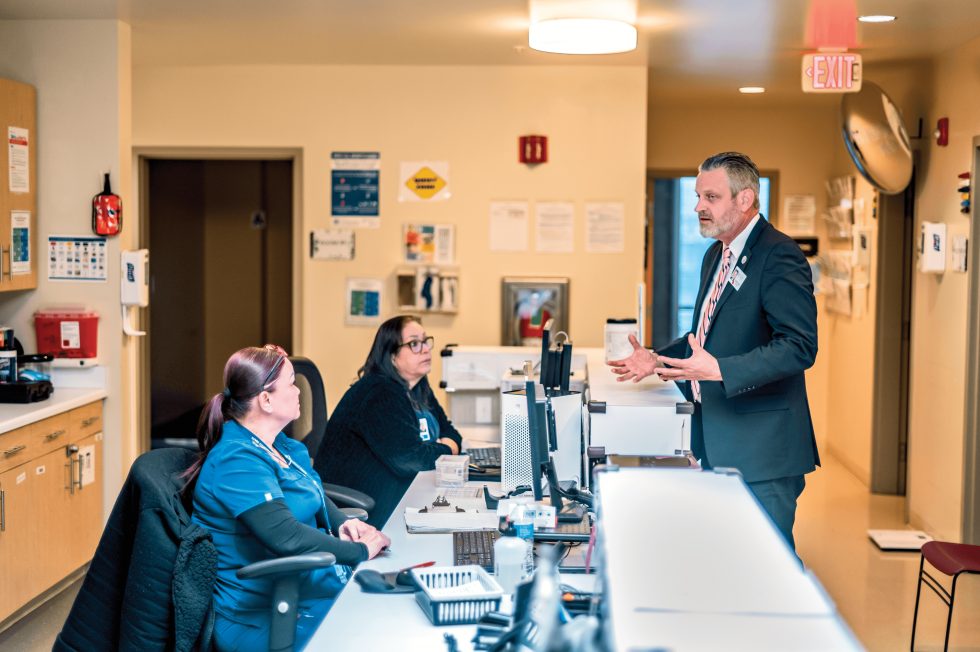
“I liken my childhood to wandering around in a glass bottom boat, looking down at the reef and the sharks,” Porteus says.
Even amidst the harsh conditions, Porteus found good. A mathematical genius who Porteus says had become “completely psychotic” taught him calculus. A former concert pianist who’d become homeless could still play sections of piano in Porteus’s dad’s church and also was willing to teach what he knew. It’s maybe helped to fuel Porteus’s faith in what people, even those who are broken, can become.
“I don’t know where the next Buddha is or the next messiah, but they could be right there in front of you on the street,” Porteus says. “Everyone has that potential.”
Porteus initially wanted to be a veterinarian, saying he wanted to take care of animals who couldn’t say how they felt. Eventually, someone let him know that humans weren’t great about this either. He came to America for college, where he studied to become a psychologist and where he’s been based long-term. He’s been in Sacramento since 2001.
There have been hardships along the way, such as Porteus’s older brother developing schizophrenia. “One of the great tragedies of my life was to kind of lose him to that illness,” Porteus says.
All the same, Porteus has his share of high-powered champions, such as Sacramento Mayor Darrell Steinberg, who authored the state’s Mental Health Services Act while serving in the California Senate.
“I may be their biggest fan,” Steinberg says of WellSpace. “I’ve known Dr. Porteus for a long, long time. And he is always on the cutting edge (on) how to help people with the most serious mental health and substance abuse conditions and those who are poor and dealing with very difficult health conditions as well.”
In recent years, this has manifested with creating the Crib.
Getting the Crib going
WellSpace’s downtown Crib center opened in October 2020, months into the COVID-19 pandemic, as an alternative to taking someone intoxicated, acutely psychotic or otherwise in crisis to jail or a lockdown mental health facility.
“I’m a licensed clinical psychologist,” Porteus says. “What I see is that we have an overuse of the acute care facilities. And it’s because we don’t have something in between. So we have people in crisis, and we literally don’t give them an opportunity to resolve that.”
What individuals who go to the Crib get is a small facility, with room for about 20 people, where they can recharge their batteries and are free to leave at any time. Matt McPhail of the Sacramento Police Department said that law enforcement brings people for the first 24-hour stay but that people can self-refer thereafter.
The mood at the Crib can be sedate. A common room has a television where one man was watching the end of the 2003 film “Bruce Almighty” when Comstock’s toured the facility. Other people appeared to be sleeping in small rooms nearby.
Backgrounds of people who’ve used the Crib can vary, according to Christie Gonzales, WellSpace’s chief program officer.
“I always say people in suits who drive a Mercedes who just needed somewhere to sleep it off so they didn’t get a DUI; we’ve had plenty of them,” Gonzales says. “And then we’ve also had people who are chronically unhoused, chronic mental illness.”
McPhail, who is now an acting lieutenant in Sac PD’s evidence and property division, says he personally took people to the Crib while serving as a bike sergeant downtown. McPhail says that the department referred 80 people to the Crib in 2023, with these people then self-admitting to the center about 300 times. He remains grateful for what the center and WellSpace can do.
“Realistically, the police department cannot fix every single aspect of every single problem,” McPhail says. “We have a role to serve in a lot of these things. But there really is an important element that community-based organizations like WellSpace play in helping us to partner to solve some of these issues.”
The road ahead
Initially, the Crib was operated with pandemic-era funding, including the American Rescue Plan Act. Since July 1, WellSpace has been covering the cost of the center, in part because meeting reporting requirements for certain types of government funding or grants is tricky.
WellSpace Health has several locations around the Capital Region.
With 150,000 patients, it is one of the largest employers in the
area.
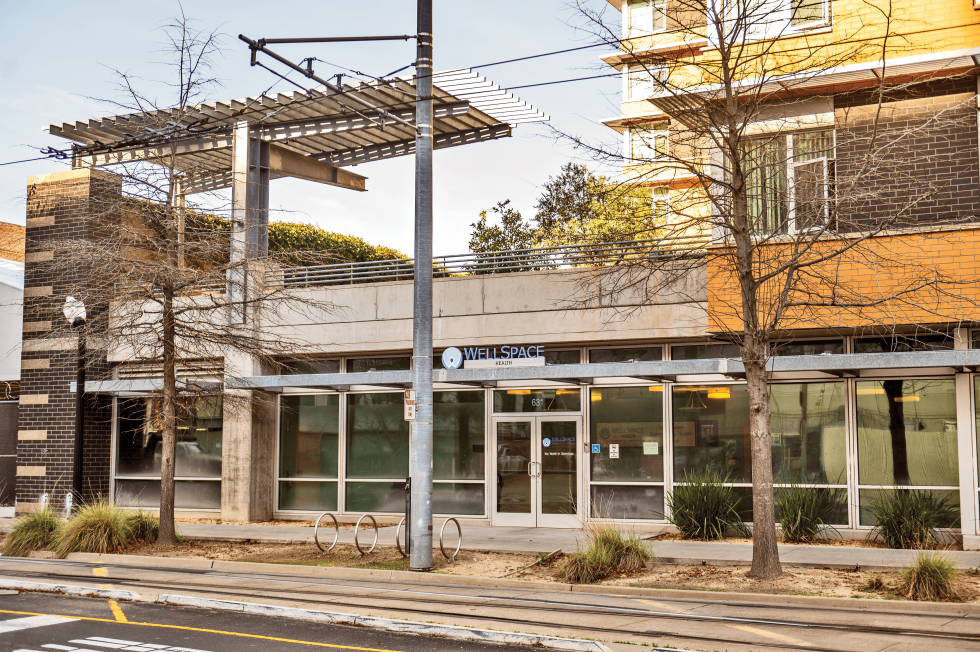
The Crib has a low barrier for entry by design, with law enforcement able to drop off people in three to five minutes and WellSpace not demanding detailed information from patients. This is great for getting anyone in crisis served, but it can create accounting headaches.
“Sometimes, our electronic health records even have a record that says ‘Bulldog,’ because that’s all he’s comfortable giving us at this moment,” Gonzales says.
All the same, Timothy Lutz, director of health services for Sacramento County, hasn’t shut the door to helping fund Crib locations, such as one that WellSpace is in the process of opening on Stockton Boulevard as part of a comprehensive suite of services at the former Little Saigon center.
“What we’ve been looking at is one, this has been a huge benefit,” Lutz says. “We know sobering centers, drop-in types of locations are a critical gap. And so our behavioral health team is working with WellSpace to really develop a billable model which brings it under Medi-Cal site certification and starts to bill for those services when patients come in.”
There are some quantifiable results associated with Crib already. Porteus notes that the center has had more than 7,500 visits since opening, with just 4 percent of people sent to the hospital. WellSpace is also using the Crib to help refer people to detox 10 years sooner than if these people had waited to do it on their own.
“We consider the Crib to be what we call the front porch to services,” Porteus says.
Patrick Kennedy, a member of the Sacramento County Board of Supervisors, also sings WellSpace’s praises.
“If I sound like I’m a cheerleader for WellSpace, it’s because I am,” Kennedy says. “I mean, you talk about the Crib. I’m looking at it right now through my office window. And the operation that they run is really a model for any other health care organization in the country.”
Interestingly, WellSpace’s community health centers for the low-income general public don’t have great reviews across the board online. Still, this doesn’t seem to faze Porteus, who’d happily steer WellSpace away from this part of its book of business if he could and hone in on more challenging behavioral work.
“That’s where we started,” Porteus says. “We were always the people focusing on I guess what we would call the highest-hanging fruit. My goal would be if another health system wanted to step in and take people who are incredibly stable, who we’ve stabilized, I’d be happy for them to do it. At the end of the day, it’s people who are most in distress who need us.”
Stay up to date on business in the Capital Region: Subscribe to the Comstock’s newsletter today.
Recommended For You
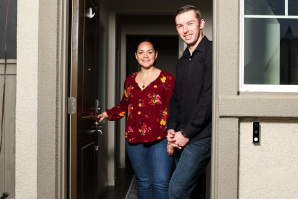
Is the Housing Market Stuck?
High interest rates and low inventory are disrupting the housing market, but there are options for frustrated homebuyers
First-time homebuyers are feeling priced out of the market and fear they may have to rent for the foreseeable future. Homeowners who want to sell are wary of parting with their 3 percent interest rate. As a result, low inventory coupled with high interest rates has made for a very tight housing market.

Photo Essay: Afghans Resettling in Sacramento
The Capital Region is home to more than 10,000 Afghan refugees who fled the Taliban. Comstock’s brings you a few of their stories.

The Evolution of Aesthetics
Women and men have a variety of ways to look their best in the Capital Region
When it comes to “having a little work done,” it’s all about perception. “I was actually one of those people who thought they would never do Botox in their life,” says Shawna Chrisman, nurse practitioner and founder of Destination Aesthetics. “I just wanted to age gracefully.” But a product called Lattise — which she calls her “gateway” — changed her perspective on what that means.

Residential Renaissance
New affordable apartment complexes offer appealing amenities such rooftop terraces, courtyards and shared community spaces
Some of the most exciting architecture being designed and built in the Capital Region today is multifamily residential. Attractive, amenity-rich condominiums, apartments and duplexes are popping up everywhere, proving that single-family luxury homes aren’t the only drool-worthy dwellings on the real estate market.

The Delta in Decline
Wildlife and businesses in the Sacramento-San Joaquin Delta are suffering from lack of fresh water
The life cycle of a salmon, so the story goes, is a heroic journey. The fish emerge from fertilized eggs in a river bed, swim to the ocean where they spend most of their lives and return to give birth in the exact place where they were born.

What’s Ahead for the Region’s Economy in 2024
Positive news, though risks abound
Those who forecast the direction of the U.S. economy have their eyes on empty office buildings. In September, two commercial real estate experts predicted that the vacant space resulting from work-from-home policies will put banks at risk and collapse tax revenues for large and mid-size cities around the country.



